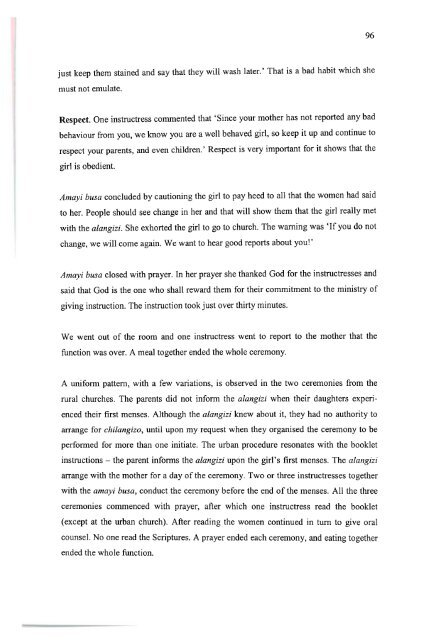FROM CHINAMWALI TO CHILANGIZO:
FROM CHINAMWALI TO CHILANGIZO:
FROM CHINAMWALI TO CHILANGIZO:
You also want an ePaper? Increase the reach of your titles
YUMPU automatically turns print PDFs into web optimized ePapers that Google loves.
just keep them stained and say that they will wash later.' That is a bad habit which she<br />
must not emulate.<br />
Respect. One instructress commented that 'Since your mother has not reported any bad<br />
behaviour from you, we know you are a well behaved girl, so keep it up and continue to<br />
respect your parents, and even children.' Respect is very important for it shows that the<br />
girl is obedient.<br />
Amayi busa concluded by cautioning the girl to pay heed to all that the women had said<br />
to her. People should see change in her and that will show them that the girl really met<br />
with the alangizi. She exhorted the girl to go to church. The warning was 'If you do not<br />
change, we will come again. We want to hear good reports about you!'<br />
Amayi busa closed with prayer. In her prayer she thanked God for the instructresses and<br />
said that God is the one who shall reward them for their commitment to the ministry of<br />
giving instruction. The instruction took just over thirty minutes.<br />
We went out of the room and one instructress went to report to the mother that the<br />
function was over. A meal together ended the whole ceremony.<br />
A uniform pattern, with a few variations, is observed in the two ceremonies from the<br />
rural churches. The parents did not inform the alangizi when their daughters experi<br />
enced their first menses. Although the alangizi knew about it, they had no authority to<br />
arrange for chilangizo, until upon my request when they organised the ceremony to be<br />
performed for more than one initiate. The urban procedure resonates with the booklet<br />
instructions - the parent informs the alangizi upon the girl's first menses. The alangizi<br />
arrange with the mother for a day ofthe ceremony. Two or three instructresses together<br />
with the amayi busa, conduct the ceremony before the end of the menses. All the three<br />
ceremonies commenced with prayer, after which one instructress read the booklet<br />
(except at the urban church). After reading the women continued in turn to give oral<br />
counsel. No one read the Scriptures. A prayer ended each ceremony, and eating together<br />
ended the whole function.<br />
96

















